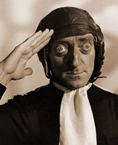Jonathan Palfrey
Posts: 535
Joined: 4/10/2004
From: Sant Pere de Ribes, Spain
Status: offline

|
quote:
ORIGINAL: Hard Sarge
still think you got to go with the fact that, the commander in the game is not some guy who fought back then, the player has better control and command over his troops then they did, and there is little chance of total screw ups, plus we got the chance to stop the battle when we know the battle is won, how many of these troops that were lost were lost trying to do more then was needed ? when the battle was over
Eric can model as much as he can. he can not model the player to play as the real guys did
I appreciate your comments, which are worth considering in the context of the game. However:
1. What we're talking about here is a PBEM game, with quick battles, so the player's tactical ability doesn't come into it. The quick battles should give the same kind of results that the real war did.
2. Even in a solo or network game, with detailed hex battles, is the player in his armchair really any better than Lee or Grant? I don't think so. If the player gets better results, it's because there's something unreal about the simulation. For instance, typically the player in a battle game has too much control, more than the real generals ever had.
For me, this is just one of the reasons to avoid the detailed hex battles. This is not really a simulation, it's just fairy-tale stuff. You may be really skillful at playing this kind of game; but if you think you're facing the same kind of challenge that the real generals faced, you're kidding yourself.
The strategical game isn't reality either, but it has the potential to be a bit closer to reality. In the strategical part of the war, there was more time to think, and there was genuinely more control. There were no mobile phones on the battlefield, but the telegraph and the railways permitted relatively fast strategical communications.
|
 Printable Version
Printable Version










 I would like to see at least this changed for immersion purposes.
I would like to see at least this changed for immersion purposes.


 New Messages
New Messages No New Messages
No New Messages Hot Topic w/ New Messages
Hot Topic w/ New Messages Hot Topic w/o New Messages
Hot Topic w/o New Messages Locked w/ New Messages
Locked w/ New Messages Locked w/o New Messages
Locked w/o New Messages Post New Thread
Post New Thread